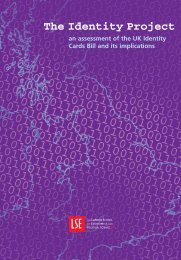Money Laundering: Review of the Reporting ... - Dematerialised ID
Money Laundering: Review of the Reporting ... - Dematerialised ID
Money Laundering: Review of the Reporting ... - Dematerialised ID
You also want an ePaper? Increase the reach of your titles
YUMPU automatically turns print PDFs into web optimized ePapers that Google loves.
kpmg<br />
<strong>Review</strong> <strong>of</strong> <strong>the</strong> regime for handling Suspicious Activity Reports<br />
Report <strong>of</strong> recommendations<br />
KPMG LLP<br />
<strong>the</strong> precedent for LEAs to focus solely on <strong>the</strong> money laundering aspects <strong>of</strong> an individual<br />
case ra<strong>the</strong>r than predicate <strong>of</strong>fences if <strong>the</strong>y so wished.<br />
Abacha<br />
3.3.3 A new democratic government in Nigeria was formed in 2000 following <strong>the</strong> death <strong>of</strong><br />
General Sani Abacha. It alleged both that a number <strong>of</strong> banks in Switzerland and <strong>the</strong> UK<br />
had established accounts linked to <strong>the</strong> family and close associates <strong>of</strong> General Abacha, and<br />
that <strong>the</strong>re had been significant turnover across those accounts. Both <strong>the</strong> Swiss regulators<br />
and <strong>the</strong> FSA launched investigations into <strong>the</strong> due diligence and control procedures in <strong>the</strong><br />
banks identified as having opened <strong>the</strong>se accounts. A number <strong>of</strong> Swiss banks were named<br />
and publicly censured for <strong>the</strong>ir account opening failures. The FSA announced that 23<br />
banks in <strong>the</strong> UK had accounts linked to <strong>the</strong> family, and that on investigation 15 banks<br />
which it supervised had significant control weaknesses and deficiencies in procedure in<br />
relation to AML.<br />
3.3.4 The risk <strong>of</strong> public censure and regulatory enforcement because <strong>of</strong> poor AML controls and<br />
procedures rose significantly following <strong>the</strong> Abacha case. The FSA’s formal statements<br />
on <strong>the</strong> case specifically highlighted inadequate senior management oversight <strong>of</strong> <strong>the</strong><br />
account opening process for higher risk customers. They also highlighted <strong>the</strong> importance<br />
<strong>of</strong> senior management involvement in and commitment to AML controls.<br />
The aftermath <strong>of</strong> 11 September 2001<br />
3.3.5 The terrorist attacks on <strong>the</strong> World Trade Centre and <strong>the</strong> Pentagon on 11 September 2001<br />
provided fur<strong>the</strong>r impetus for Governments and LEAs around <strong>the</strong> world to focus on <strong>the</strong><br />
question <strong>of</strong> terrorist financing. Investigations into <strong>the</strong> hijackers’ movements and<br />
behaviour prior to <strong>the</strong> attacks identified both that <strong>the</strong>ir activities were financed through<br />
apparently legitimate financial services transactions and that <strong>the</strong> amounts concerned were<br />
relatively low. The challenges <strong>of</strong>fered to both financial institutions and LEAs in <strong>the</strong><br />
identification <strong>of</strong> terrorist finance, arising as it does from primarily legitimate business and<br />
personal sources <strong>of</strong> funds, places significant fur<strong>the</strong>r burdens on all those involved in <strong>the</strong><br />
reporting <strong>of</strong> potential suspicious activity.<br />
The role <strong>of</strong> <strong>the</strong> FSA post-N2<br />
3.3.6 The implementation <strong>of</strong> <strong>the</strong> Financial Services and Markets Act 2000 (“FSMA”) at N2<br />
(midnight on 30 November 2001) placed a new formal obligation on <strong>the</strong> FSA in relation<br />
to <strong>the</strong> regulatory focus on financial crime. Prior to that date, <strong>the</strong> nine former regulatory<br />
bodies had no explicit statutory requirement to address financial crime issues o<strong>the</strong>r than<br />
as <strong>the</strong>y impacted upon <strong>the</strong>ir regulatory objectives.<br />
3.3.7 One <strong>of</strong> <strong>the</strong> FSA’s four statutory objectives set out in FSMA is <strong>the</strong> reduction <strong>of</strong> financial<br />
crime 8 , primarily reducing <strong>the</strong> extent to which it is possible to use regulated financial<br />
services companies for purposes connected with financial crime. The definition <strong>of</strong> crime<br />
that has been adopted includes handling <strong>the</strong> proceeds <strong>of</strong> crime. FSMA also provides <strong>the</strong><br />
FSA with <strong>the</strong> power both to make and enforce regulatory rules on money laundering and<br />
to prosecute for breaches <strong>of</strong> <strong>the</strong> MLRs.<br />
8 Section 6 <strong>of</strong> FSMA sets out <strong>the</strong> financial crime objective.<br />
jo/fh/519 26









